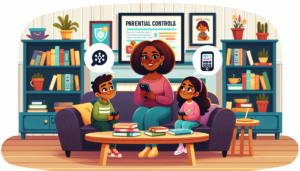| Discussion Topics | Description |
|---|---|
| Screen Time Expectations | Align on daily screen time and establish rules for device usage around family time and bedtime. |
| Online Gaming Awareness | Educate about online gaming risks, including financial scams, phishing, and protecting personal information. |
| Cyberbullying Awareness | Discuss the reality and consequences of cyberbullying and the importance of reporting it to a trusted adult. |
| Continuous Dialogue | Maintain ongoing discussions about digital behavior and safety. |
| Safe Browsing Practices | Teach and enforce safe browsing habits to protect against malicious content. |
| Using Parental Controls | Implement Safe Lagoon’s parental controls to monitor and manage online activity. |
| Emergency Protocols | Instruct children on how to handle encounters with online predators or bullies, including how to block and report them. |
A lot of responsibility comes along with that first tech gift, both for your children and for you. According to recent research, 84% of parents worry about their children’s online safety, but on average, they only spend 46 minutes talking to their children about online security.
As a first step, consider sitting down with your children to talk about an “electronics contract” or some type of agreement that outlines your family’s online safety expectations. Use this list of three topics as a guide, and keep the conversation open so that your children can add in any topics they’d like to discuss.
Screen Time Expectations
Do you think an hour or two is enough screen time for your children each day? They probably have a totally different idea of how much time they need! The Centers for Disease Control and Prevention (CDC) says that the average amount of time children spend on screens breaks down like this:
- Ages 8–10: 6 hours per day
- Ages 11–14: 9 hours per day
- Ages 15–18: 7.5 hours per day
What amount of screen time do doctors recommend? That looks like this:
- Ages 2–12: 1 hour per day
- Teens and adults: 2 hours per day (not including homework)
There’s quite a wide gap between what doctors are recommending for screen time and what children are actually experiencing. That’s why it’s crucial to discuss expectations with your children. Make a plan together with your kids. You may also want to talk about other limits that aren’t necessarily time-based. Think about setting rules to turn off screens at dinner and an hour before bed, keeping devices in your room overnight, or making sure certain chores are completed before your children can have their devices.
Video Games Aren’t Just Games
The world of video games has come a long way since Donkey Kong was released in 1981. Now, online games connect players of all ages from across the globe. There’s a benefit to that. As Internet Matters puts it, online video games “offer a huge amount of fun, enjoyment, teamwork, collaboration, and imaginative adventure for children.”
But, as you probably already know, there’s a dark side to online gaming. Children are often duped into buying extras for their game without fully realizing the financial implications. They might unknowingly fall victim to a phishing scam or a malware attack. They may also inadvertently release personal information to other players. Most of these other players are harmless, but some may be predators.
Be sure to talk to your children about the simple fact that not everybody on the internet is who they say they are. Instruct your children to never give away their personal information in a video game. This includes their name, address, phone number, age, and school. They should also never use a real photo of themselves.
Talk to your child about what to do if they are contacted by a predator. In nearly every video game, there are ways to block people and report them to the owner of the game. Predators will often tell children to keep their relationship secret or threaten them if the children want to block them, so be sure that your children know that they will not get in trouble for reporting inappropriate behavior.
Cyberbullying Has Consequences
Cyberbullying is on the rise. CDC statistics show that more than 15% of high school students were electronically bullied in the past year. Young teens might not know exactly what cyberbullying is or how to stop it. You may want to frame your discussion around in-person bullying, a topic they’re likely to be familiar with.
Cyberbullying includes anything that’s posted online with the intent to hurt, harass, or upset someone else. It includes things like ganging up on somebody in a text message, sending threatening messages through social media, soliciting explicit photos, or posting embarrassing videos of someone online.
As with online predators, make sure your children know what to do if they see cyberbullying happening: tell a trusted adult. This is critically important because cyberbullying can get out of hand quickly. Sadly, many children have committed suicide due to fallout of cyberbullying.
These three topics are some of the most important things to discuss with your children before they start using electronic devices. As we all know, children probably won’t remember all of the details. That’s why it’s important for parents to keep the conversation going and to be able to easily protect their children online. With Safe Lagoon, you can block dangerous sites, monitor social networking, schedule screen time, and much more. Check out our blog for more helpful tips!





